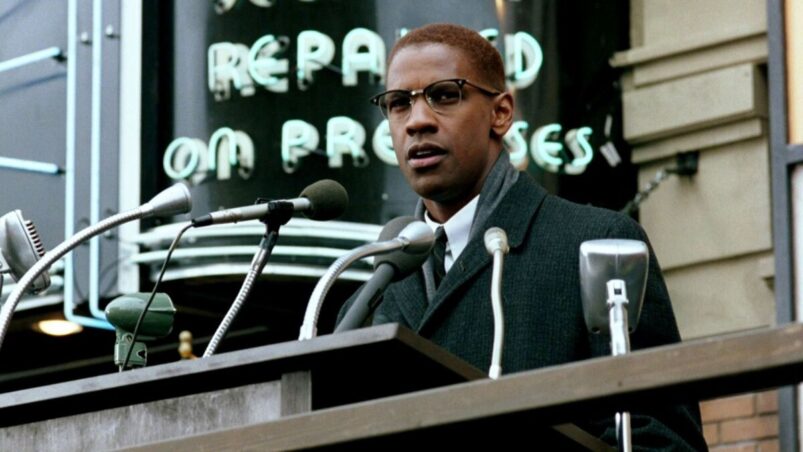Malcolm X is considered by some to be the greatest biopic of all time, and it’s easy to see why. It has an engaging story, impeccable acting, and Spike Lee’s polished and assertive direction. A Spike Lee passion project like this was bound to bring out his full arsenal of skill, so much so that you could even say that Malcolm X is his true defining film, though it’s a toss-up between this and Do the Right Thing. This film has become synonymous with the director’s name because of its impact and the sheer importance of the story.
As soon as the film begins, that famed Spike Lee style gets to work; the framing of the streets and the people, the unorthodox camera angles and vibrancy like no other, and a soundtrack that automatically cements the thought in your head that “this is a Spike Lee joint”. This film is as smooth as silk, as stylish as a zoot suit, and still as powerful a biopic 30 years on.
There’s one major contributing factor to the film’s undeniable success, and that’s the execution of the character by the film’s star Denzel Washington, with one of the best performances of his star-studded career. It’s a performance that will go down as one of the greatest in cinema history, and it’s a shame he didn’t win the Oscar for his performance, which instead went to Al Pacino for his work in Scent of a Woman.
This is a project that almost didn’t happen due to the opposition shown to Lee by the Nation of Islam (NOI), and its leader Louis Farrakhan, who didn’t want to be shown in such a negative light. It also lacked the required financial backing from Warner Bros. The film ended up being saved through the efforts of several black celebrities like Michael Jordan, Oprah Winfrey, and Prince, and the rest, as they say, is history.
One of Malcolm X’s best aspects is how well it explores the chapters in the man’s life that are still so mysterious to some people. They become key in establishing who the man was, and how each mentor along the way paved his path and led him to become the man history knows. From his origins living in a poor household troubled by sickening neighborhood racism to a two-bit con man with a need for white women and flash suits, before his fiendish life eventually caught up with him and prison inevitably came calling. And it was in jail that his righteous life began, and like Malcolm explains in the film: “a man’s good deeds far outweigh any of his transgressions.”
For a biopic of this magnitude though, it does seem unusual that several important events were omitted from the film, including the fact that Malcolm’s brother was the figure that led to his involvement with the NOI, and how Brother Baines was a completely fictional character created for the film. The biopic also skipped over how Malcolm’s pilgrimage to Mecca was funded by his sister. In fact, details about his brothers and sisters are incredibly vague throughout the film, and with no answers as to why this decision was made, it creates so much confusion where confusion shouldn’t be.
Regardless of the controversy that surrounds this film, there is no question that it’s one of the most defining biopics of all time — even its 201-minute length cannot detract from that fact. And a biopic about one of the most important figures in black history meant that Lee could give it his full might, and a few major hiccups along the way still couldn’t derail this passion project from becoming what it needed to be.
READ NEXT: 15 Best Biopics of All Time You Should Watch
Some of the coverage you find on Cultured Vultures contains affiliate links, which provide us with small commissions based on purchases made from visiting our site.

